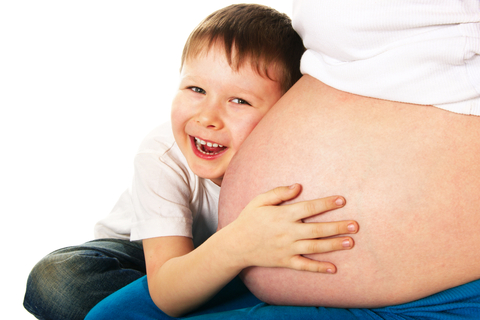
Whether planned or not, a lot of us who practice extended breastfeeding find ourselves breastfeeding while pregnant. This is normal and common in many cultures.
Once you address a few potential concerns, you just need to be sure that you get enough nutrition, water, and rest as your body is nourishing three.
My first child was 24 months old and still breastfeeding frequently when I got pregnant with my second child. I had some of the common issues, like nipple sensitivity and lower milk production, but we maintained the breastfeeding relationship. Even the Braxton-Hicks contractions weren’t too much to bear until the day my son was born. That day, the bedtime feeding brought on such strong contractions that we skipped a feeding, for the first time in nearly three years. My son was born a few hours later.
Once my baby was born, I nursed both children for another two years. If I hadn’t seen a photo of one of my online friends showing how she stacked her tiny baby on top of her toddler, it might never have occurred to me that it was possible to breastfeed two children at once. Sitting with a baby and a toddler on my lap breastfeeding or holding my two children in my arms as we all fell asleep as they nursed, these are some of my sweetest memories of their young lives.
I was and am so grateful for women who share their experience so others can expand their own possibilities. That is how I expanded my own possibilities. If breastfeeding while pregnant then tandem nursing hadn’t occurred to you, I hope this opens a door for you.
“In a study of 179 mothers who had breastfed for at least six months, 61% had also breastfed during a subsequent pregnancy.1 Of these, 38% went on to nurse both newborn and toddler postpartum, an arrangement known as ‘tandem nursing.’”
Hilary Dervin Flower, “A New Look at the Safety of Breastfeeding During Pregnancy,” August 1, 2011, KellyMom.com.
Nutrition Concerns
To a great extent, you control your nutrition by what you take in. If you are pregnant AND breastfeeding an infant (not a busy toddler who checks in less often), you will probably need more calories.
Health Canada estimates energy requirements for a pregnant woman increase by 340 over the mother’s basic needs during the second trimester and by 452 calories during the third trimester. For breastfeeding, the energy requirements go up by 330 calories for a child 0-6 months and by 400 calories for a child 7-12 months. At the point when a child is no longer exclusively breastfeeding, the mother does not necessarily need to boost caloric intake over her basic needs. Not adding calories can help a mother lose some of the pregnancy weight if it is still lingering.
If you have a 4-month old exclusively breastfeeding and you are one month pregnant, you will need extra calories for the breastfeeding but not for the first trimester of the pregnancy, and you might find that your milk supply decreases too much for your newborn. You should watch your baby’s weight gain closely. If you have a 9-month old exclusively breastfeeding when you discover that you are one month pregnant, you will probably need to be aware of adding calories for both your breastfeeding baby and your pregnancy by the second trimester. That will mean about 740 extra calories a day. Your lactation consultant, midwife, or doctor can make specific recommendations.
Contraction Concerns
One of the most common worries I see associated with breastfeeding while pregnant is the possibility of miscarriage or early labor. Oxytocin released during breastfeeding does cause contractions, but these contractions are so mild that most women don’t notice them. (KellyMom)
Unless there is a specific medical reason to expect pre-term labor or miscarriage, very mild contractions during breastfeeding are not necessarily a reason to wean your child during pregnancy.
Comfort Concerns
If you experience nausea or fatigue during pregnancy, breastfeeding could potentially increase either. You will need great nutrition and plenty of rest. Fortunately, focused breastfeeding time could give you regular rest time. Keep snacks near your favorite nursing area. Eating a few crackers and having a drink while breastfeeding can take the edge off of nausea.
Many women experience nipple sensitivity during pregnancy. This is caused by hormone levels and can be mild or extreme. Breastfeeding while your nipples are very sensitive can be excruciating. Toddlers can get lazy with their latch, so be sure your child has taken a full mouthful and isn’t pulling from your nipple. You can also just ask your toddler to be quite gentle with you. Some women use this time to practice pain management techniques they learn for the birthing process.
You Are the One Who Knows
You are the one who knows whether or not you should continue breastfeeding your baby through pregnancy then continue tandem nursing both children. Watching those babies reach out and touch one another, bonding while they sit on your lap nursing, can be one of the most moving experiences of a chaotic life with young children. But, you need to ensure everyone’s nutrition, safety, and comfort before you get to that point.
Resources for Breastfeeding While Pregnant
If you plan to breastfeed while pregnant, you will probably find it helpful to talk to a La Leche League Leader who has done the same. It can be very reassuring to share the experience with someone who has been there.
For more evidence and experience, I recommend the following articles.
- Hilary Dervin Flower, “A New Look at the Safety of Breastfeeding During Pregnancy,” August 1, 2011, KellyMom.com. The primary concern addressed in this article is whether breastfeeding can be a safety issue for your pregnancy.
- “Breastfeeding While Pregnant: The Ins and Outs,” AttachFromScratch.com. This long post shares personal experience and advice.
Image © Marina Dyakonova | Dreamstime.com
